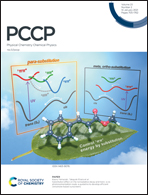Quantum interference enhances rectification behavior of molecular devices†
Abstract
We present a theoretical and computational work and demonstrate that cross-conjugated molecules with electron-donating groups are efficient rectifiers with high conductance. The rectification ratios obtained are up to one order of magnitude at an applied bias voltage of 0.3 V. The use of electron-withdrawing groups to form donor–bridge–acceptor triads gives rectification ratios of the order of 102. We found that the high rectification results from localizing the Highest Occupied Molecular Orbital (HOMO) at one end of the molecular device. When the HOMO is localized, quantum interference effects substantially enhance rectification. Our observations rely on transport calculations of linearly-conjugated and cross-conjugated molecules using Non-Equilibrium Green's Function Technique and Density Functional Theory (NEGF-DFT). Analysis of transmission functions suggests a dependency of the rectification ratio on the anti-resonance peak position near the Fermi level of the electrode, allowing the possibility to modulate molecular rectification through electrochemical gating.



 Please wait while we load your content...
Please wait while we load your content...